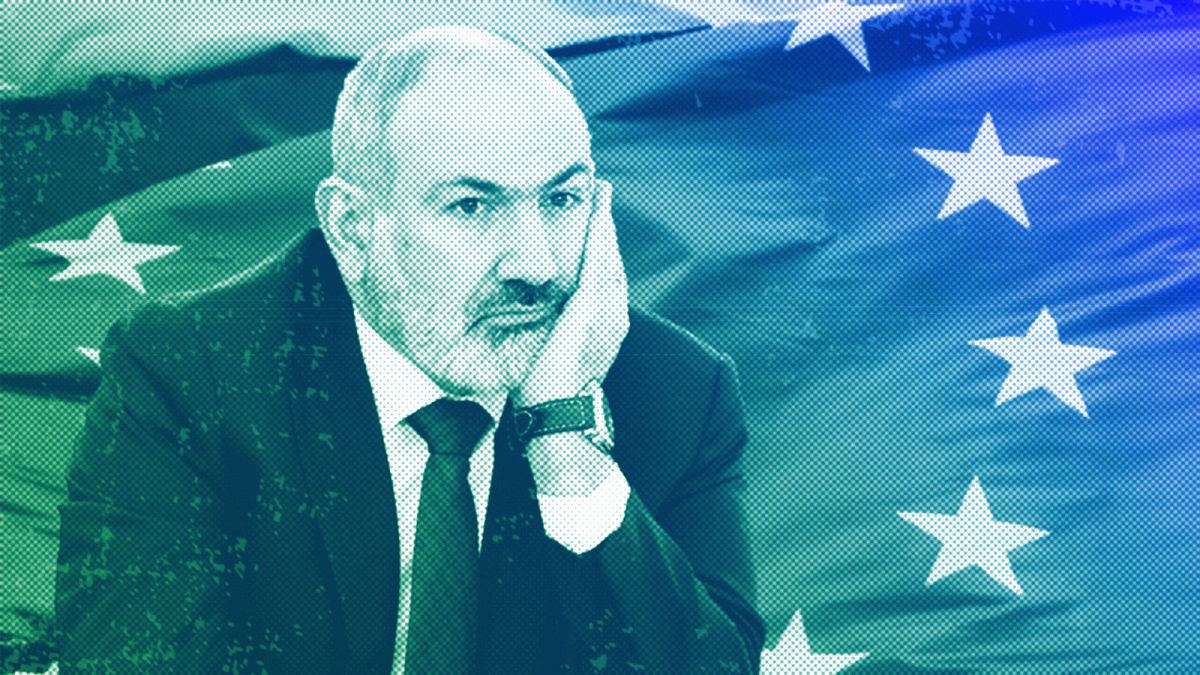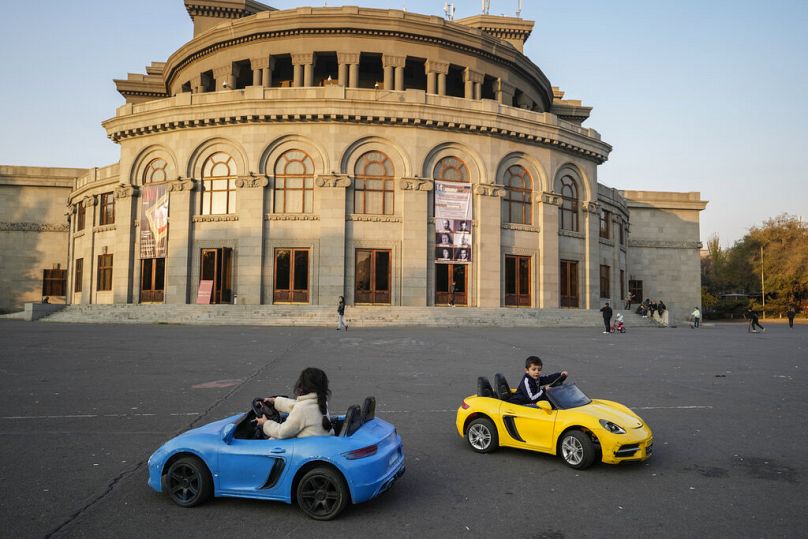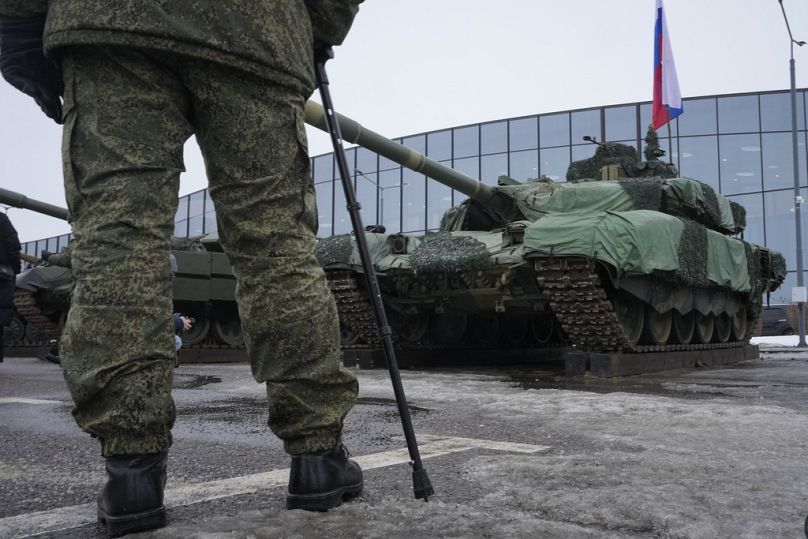Since February 2022, Russia has replaced the EU as Armenia’s most important trading partner — an unflattering result showing Moscow has diversified its sources of war-critical goods required for weapons production via smaller countries, Oliver Rolofs writes.
As Russia's war against Ukraine passes the two-year mark, yet another country is trying to leave Moscow's sphere of influence: Armenia.
The European Parliament has recently backed a motion calling for Armenia’s candidacy for EU membership, based on common values such as democracy, the rule of law, human rights and fundamental freedoms.
However, there is still a long way to go, especially as Yerevan's new Western course does not correspond with the realities of the EU's sanctions policy towards Russia, as current trade figures show.
A few days ago, the EU adopted its 13th package of sanctions against Russia, expanding the list of goods that can no longer be exported to the country.
The measures against Moscow go far beyond traditional sanctions, which historically have targeted banks and elites.
However, Russia's economy still steadily grows. Russia can’t buy much directly from the West but despite the European technology embargo, war-related goods from the West continue to find their way into the Russian defence industry.
The war has become a battle of materiel, with Ukraine under increasing pressure and Russia threatening to win.
This is because Russia’s war economy produces sufficient supplies — and can continue to rely on Western components, including those from Armenia, as the Caucasus country remains an important logistical hub for the Russian economy.
Russia replaces EU as Armenia’s top trading partner
The numbers speak for themselves. According to the German Federal Statistical Office, German exports to Armenia rose by more than 165% in the first year of the war.
At the same time, according to reports by the European Bank for Reconstruction and Development (EBRD) and the US think-tank Silverado, Armenian exports to Russia exploded many times over — by 187%, according to the Armenian Ministry of Finance.
A year later, in the first nine months of 2023, Armenian exports of goods to Russia increased by a further 85%, 80% of which were re-exports.
Since the start of the war, Russia has replaced the EU as Armenia’s most important trading partner — an unflattering result. The example of Armenia shows how Russia has diversified its imports of so-called war-critical goods, which are required for weapons production, via smaller countries.
These products, known as "common high-priority items" (CHP goods), include semiconductors, communications equipment, circuits, other computer parts and certain electrical components.
Armenia has been one of the smaller trading partners in this area since the war in Ukraine, with an export value of €23.4 million per quarter. However, the average trade volume before the war was only €860,000.
The increase of 2,721% indicates that Armenia is also helping Russia. In a joint statement by the US Department of Justice, the Department of Commerce and the Department of the Treasury, Armenia was therefore categorised as a hub for third-party intermediaries or transhipment points for circumventing sanctions and export controls concerning Russia and Belarus.
Sanctions prove tricky
A report by Radio Free Europe showed that military equipment has been involved in the past. It questioned Armenia’s and Georgia’s stance on the war in Ukraine after three planes belonging to Iran Air Cargo, also sanctioned by the West, allegedly transported combat drones to Russia via Yerevan and Georgian airspace.
Although the Armenian authorities introduced a mandatory government licence for the delivery of microchips, transformers, video cameras, antennas and other electronic devices to Russia in May 2023, not least due to pressure from the US, observers say there are still doubts about whether this procedure will be enforced consistently.
The problem is that Russia remains in an advantageous position to import large quantities of goods needed for defence production.
According to a recent joint study by the Kyiv School of Economics and the International Yermak-McFaul Working Group on Russian Sanctions, war-related goods worth over $22 billion were imported into Russia in the first ten months of last year; only 10% less than in the corresponding period before the sanctions were imposed.
Even more controversially: according to the study, almost half of all imports come from companies from countries that are actually supporting Ukraine in its defence against Vladimir Putin's army.
US companies alone account for 26% of imports, while the proportion of war-related goods from the EU is only 6%.
This indicates insufficient efforts by manufacturers, including EU and US companies such as Intel, Texas Instruments or Michelin to seriously comply with the sanctions. Their products are still being exported to Russia via third countries such as Hong Kong, Turkey and the United Arab Emirates or smaller countries such as Armenia.
Armenia needs to choose: It's either Europe or Russia
However, the Armenian backdoor could be closed quickly.
Since Russia's attack on Ukraine, Yerevan has increasingly turned to the West and recently froze its membership of the Collective Security Treaty Organisation, or CSTO for short — a military alliance led by Russia.
Instead, the Caucasus republic concluded an extended security agreement with France just a few days ago.
Another indicator that Armenia is taking its EU membership seriously can be gleaned from the words of Foreign Minister Ararat Mirzoyan, who recently declared Yerevan seeks to forge closer ties with the West in the face of tensions with traditional ally Russia.
Against this backdrop, Brussels and Washington are endeavouring to ensure that Armenia's trade policy no longer undermines the interests of the EU and the US, which are supporting Ukraine with massive financial and military resources.
It is becoming clear: coordination between Western allies and the pooling of appropriate resources for a coherent sanctions policy remain crucial.
As they have become a primary foreign policy instrument for many Western states, they should now aim to close gaps in export control policy, make companies more accountable, combat circumvention by third countries and strengthen the institutions responsible for sanctions-related export monitoring.
There must be no exceptions for countries that prove useful to Russia in circumventing sanctions, even if they have a lobby in a European state, such as Armenia in France. This must be the aim of a strengthened 14th sanctions package to stop Putin's terrible war.
Oliver Rolofs is a strategic security and communication expert and the Director of the Vienna-based Austrian Institute for Strategic Studies and International Cooperation (AISSIC). He was previously the Head of Communications at the Munich Security Conference.
At Euronews, we believe all views matter. Contact us at view@euronews.com to send pitches or submissions and be part of the conversation.


